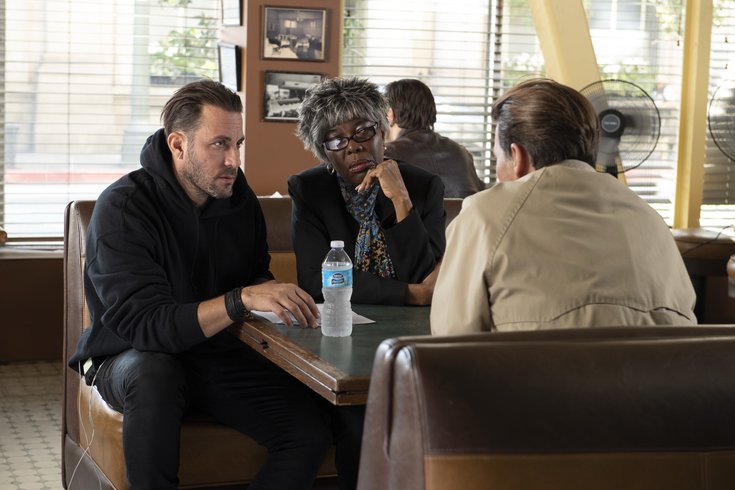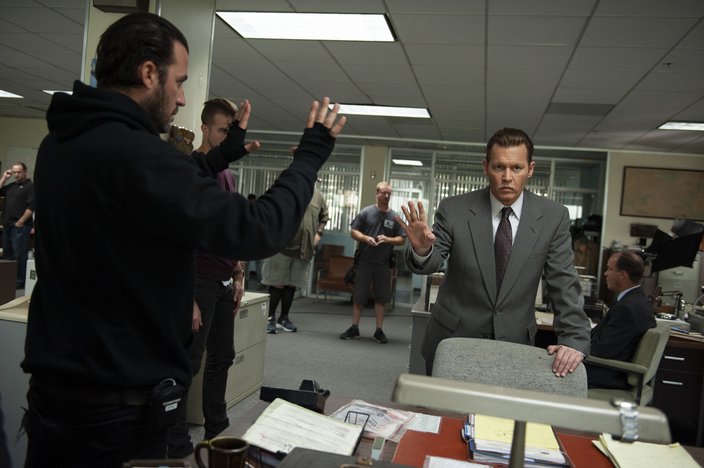
May 19, 2021
 Suzanne Tenner/for PhillyVoice
Suzanne Tenner/for PhillyVoice
On the set of 'City of Lies,' director Brad Furman, left, is pictured with Voletta Wallace, mother of slain rapper Notorious B.I.G., and actor Johnny Depp, facing away from the camera. The movie explores the unsolved homicides of Biggie Smalls and Tupac Shakur.
When Christopher Wallace, better known as the Notorious B.I.G., was gunned down in Los Angeles during the early hours of March 9, 1997, the hip-hop world was still grieving the death of Tupac Shakur, who had been killed in Las Vegas less than a year earlier.
At the time there was a raging battle between East Coast and West Coast rappers that had culminated in very public feuds and, worse, violence. Despite the turmoil, it still would have been hard to imagine then the decades-long impact their deaths would have on the music industry – both men were in their early 20s when they were killed – or that the cases would remain unsolved a quarter of a century later.
At the time of the murders, Brad Furman was a teenager living in Lafayette Hill, Montgomery County. Interested in basketball and rap music (he played two memorable seasons in the Narberth League with the late NBA legend Kobe Bryant), Furman eventually traded in his high tops for filmmaking classes at NYU and made his way to Hollywood.
He admits now that the kid listening to Biggie's "Big Poppa" and Tupac's "Keep Ya Head Up" in his bedroom never would have imagined directing a movie about their unsolved murders as an adult.
But Furman, who started his career making the kind of short films that caught the attention of directors like John Singleton of "Boyz n the Hood" fame, ended up with a compelling script about the crimes more than 20 years after the Notorious B.I.G. and Tupac Shakur died. It was inspired by the 2002 book "LAbyrinth" by Randall Sullivan that focuses on a police coverup of the crimes. It would become Furman's latest film, "City of Lies."
At first, Furman, a white guy from the Main Line, may have seemed an unlikely candidate to make a film about the most mythic and much-speculated-about murders of two of the biggest hip-hop stars in the world, but he quickly won over both the Wallace and Shakur families.
"I wasn't going to make this movie unless I went under every rock and every stone to make sure we presented the truth and honored the lives of these two men," he said.
Furman worked closely with friends and family who knew Biggie and Tupac best. The film's script, like "LAbyrinth," delves deeply into the unsolved homicides, scrutinizing the Los Angeles Police Department.
Though there are plenty of theories about who killed these men, neither case has been solved, which is something that inspired Furman, known for his gritty style of filmmaking, to sign on to the project.
"City of Lies" is the culmination of years of investigative work. The movie focuses on real-life, former LAPD detective Russell Poole, played by Johnny Depp, who starts his own detective agency post-retirement and attempts to close the books on these cases.
The film heats up when reporter Jack Johnson starts asking questions about Poole's former colleagues in the police department. Johnson, played by Forest Whitaker, is based on Sullivan, the author of "LAbyrinth." And just as in real life, the two men team up to unearth a stunning amount of late-90s police and political corruption.
"City of Lies," which was shot on location in Los Angles, originally had been set to be released in 2018, coinciding with what would have been B.I.G.'s 46th birthday. But the production was plagued from the start with issues stemming, in part, from Depp's own personal problems. At the time, the actor was accused of abuse by his former romantic partner, Amber Heard.
Frustrated, Furman pushed for a new release date, this time the 22nd anniversary of Shakur's murder – he was shot Sept. 7, 1996 in Las Vegas and died the hospital on Sept. 13, 1996 – but the film was roadblocked again, reportedly due to a lawsuit between Depp and the film's location manager. However, murmurs in the industry suggested the delay had less to do with the leading man and more about the fact that it paints an unflattering, potentially criminal portrait of the LAPD.
A new distributor was found and new release date was set – and then the COVID-19 pandemic closed movie theaters, Furman said. It's only now through on-demand, specifically Amazon Prime, that audiences have a chance to see the film.
"I thought this was a story that had to be told," Furman said over the phone from his office in Los Angeles. The Friends Select School graduate admitted he ultimately wanted to humanize the two slain stars. They were famous and influential artists of their generation, and they were real men with families and loved ones who are still seeking justice.
Furman was adamant about working with the estates of both rappers to ensure the film's historical accuracy. Biggie's own mother, Voletta Wallace, appears in the movie as herself, reminding viewers that she's a lot like the much lesser known moms we see in the media, seeking answers about the death of their children who were victims of gun violence.
"I didn't want to make the movie without the support of the families," Furman said.
Wading through the endless conspiracies to get to the actual evidence of these unsolved homicides was one challenge of making "City of Lies." A bigger hurdle was understanding and recreating the charged climate that existed in Los Angeles 25 years ago.
Many people, including Furman, believe the LAPD was not interested in solving the murders, and the director's camera focuses on at least one LAPD officer who had a close relationship with Tupac's record producer Suge Knight.
"The fact that this is a cold case today is insane," Furman said. He waded through case files and met with key players in this story, including the attorney who brought a civil case against the city of Los Angeles for its failure to reveal details about the Notorious B.I.G.'s slaying.
The experience left Furman in disbelief over the sheer amount of corruption that pervades this story.
The director's research led him to files and depositions that hadn't seen the light of day for decades. Calling Biggie's shooting "an LAPD conspiracy," Furman said "City of Lies" spotlights many key questions and details "they don't want you to see," like a record producer who allegedly wanted revenge and a connection between the cops and the Los Angeles Bloods street gang.
Furman's prior work in the music industry and his interest in criminal justice in art also shape the film. His previous directorial credits include Justin Bieber's music video for "What Do You Mean?"; the documentary about B.B. King, Buddy Guy and Sam Lay called "Buried Alive in the Blues"; 2011's "The Lincoln Lawyer," in which Matthew McConaughey's character scuttles the line between right and wrong in search of justice; and the film "The Infiltrator," based on a script his mother wrote about the true story of a U.S. Customs official who went undercover in the Medellin drug cartel.
These experiences prepared him for taking on a case as big as Biggie and Tupac's deaths at a time when racial justice is very much at a reckoning point. The Black Lives Matter movement and the verdict in the Derek Chauvin trial give the cases in "City of Lies" a renewed currency, even so many years after the murders. This timeliness can be seen in the film's treatment of issues of race and policing, something that is really at the core of the story. "Fifty percent of murders of African Americans go unsolved," Furman said. "This is a failure of the institutions to protect and serve."
The fact that the lives and deaths of the Notorious B.I.G. and Tupac still resonate among older and newer hip-hop fans is a testament to the power of their music, something not lost on Furman. It's clear that entertainment can create a landscape where new questions are safe to ask – even about the most controversial criminal cases.
The next project Furman would like to tackle is much less contentious, though no less fascinating to him as a Philly native who grew up playing basketball. It's the story of Pete Maravich, the basketball star born in Aliquippa, Pa., who is one of the youngest players inducted into the Basketball Hall of Fame.
"I take a lot of pride being from Philly," Furman said, "I think I will find my way back to make a movie."
